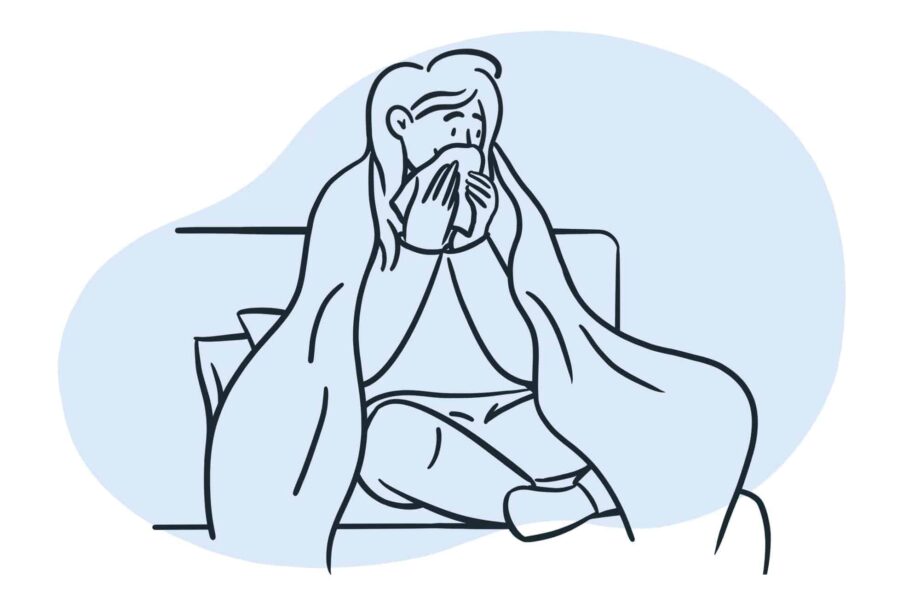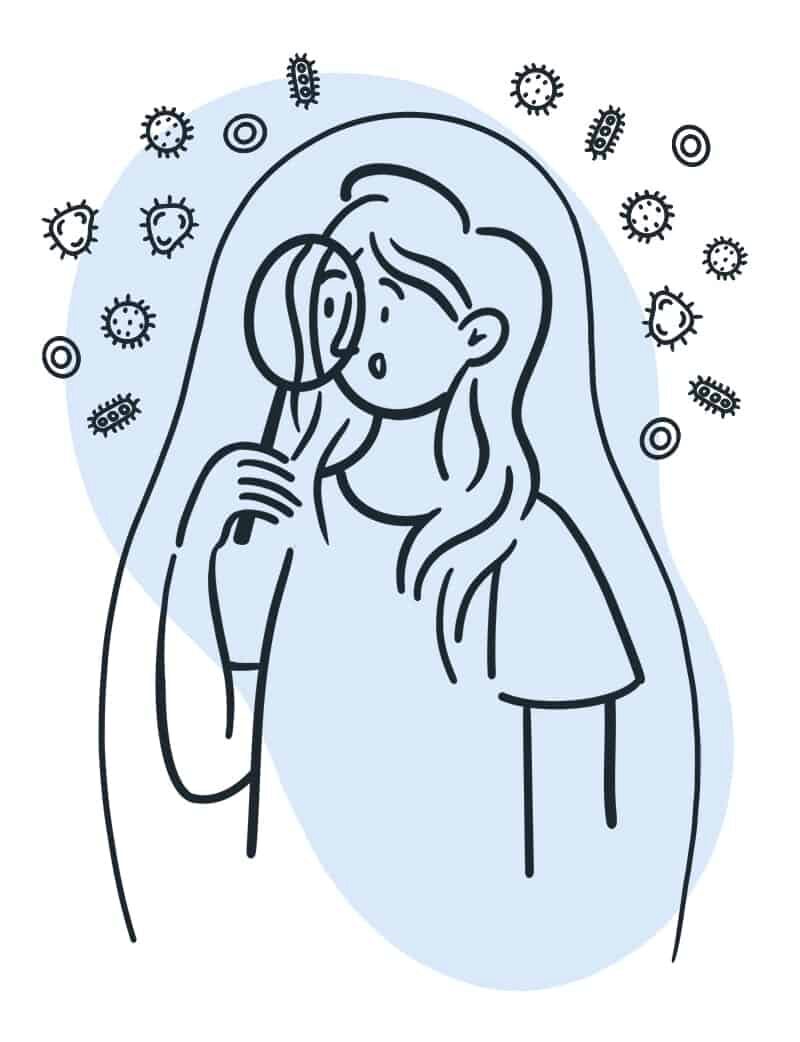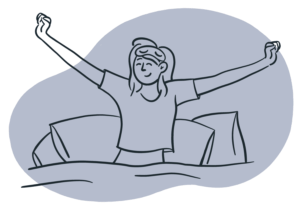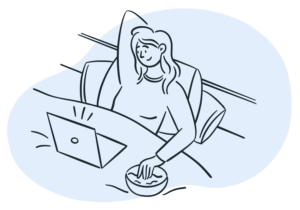Immune Function and Sleep
Disclosure: By clicking on the product links in this article, Mattress Nerd may receive a commission fee at no cost to you, the reader. Read full disclosure statement.
There’s a reason why the flu season coincides with cooler temperatures. “This is the time of year when your immune system is at its weakest,” says Janet Coleman, a certified health expert with TheConsumerMag.
Research suggests this may be due to people spending more time with others indoors where germs can spread more easily. Cold weather may also create a more sluggish immune response that makes us more prone to rhinoviruses in particular. Whatever the cause, one of the best ways we can protect ourselves from colds, flu, or even the coronavirus, is to ensure our immune system is strong and healthy. And, the best way to do this is by getting a good night’s sleep.
When we sleep, our bodies go to work repairing tissues, our brains form memories of daytime experiences, and our immune system armor up to fight off pathogen invaders.
When we deprive ourselves of adequate sleep, however, we truncate these natural processes. This puts us at increased risk of premature death, obesity, vehicle accidents, worker errors, anxiety and depression, and chronic diseases like heart disease, diabetes, and cancer.
“Sleep plays a powerful role in supporting healthy immune function,” says Marie Ruggles, author of Optimize Your Immune System: Create Health & Resilience with a Kitchen Pharmacy. “A lack of sleep has been shown in clinical trials to increase the likelihood of developing an infection and, once infected, insufficient sleep will delay your recovery time.”
Immune System Overview
The immune system is our personal body armor tasked to protect us from a variety of harmful substances, such as:
- Bacteria, viruses, fungi, parasites, and other microorganisms that cause disease.
- Harmful substances from the environment.
- Disease-causing changes in the body, such as cancer cells.

There are two subsystems within the immune system that work closely together whenever a harmful system triggers an immune response:
- The innate immune system. This is the system we are born with. It’s our first line of defense in the immune response.
- The adaptive immune system. We develop the adaptive immune system as we become exposed to different pathogens. This system provides a natural immunity, one that adapts and learns each time we become exposed to a new pathogen. Thus, the adaptive immune system helps us fight bacteria and viruses that mutate over time.
As long as the immune system is working properly, we aren’t aware of it. But when it is weakened and unable to fight aggressive germs, we get sick.
“When you get sick, your immune system kicks into action by producing antibodies and white blood cells to fight off bacteria, viruses, and other invaders. This process is called immunity,” Coleman says. “The immune system also makes sure that any foreign substances are eliminated from your body so they don’t cause infection.”
During sleep, our immune system rallies its troops by releasing proteins called cytokines. These proteins play a pivotal role in fighting infections and inflammation, as well as neutralizing stress responses. Sleep also produces antibodies and white blood cells called T-cells, both of which play a critical role in the body’s immune response to infectious diseases. Sleep deprivation decreases the production of cytokines as well as antibodies and T-cells, putting us at greater risk for infection.
“If we don’t sleep as much as we should,” says Edibel Quintero, MD, medical advisor at HealthInsider, “our body doesn’t have time to release enough of these proteins, making us vulnerable to infections and viruses.”

How Does Poor Sleep Lead to Poor Immune Health?
A growing body of evidence has found that sleep plays a critical role in how well the immune system functions. For example, a study published in the journal The Lancet, which followed more than 3,500 people of middle age found that a modest amount of sleep loss over just one night reduced natural killer cell activity an average of 72% compared to individuals who had a full night’s sleep.Natural killer (NK) cells are a type of immune system cell that target tumor cells and cells infected with viruses. In an 11-year follow up with study participants, researchers found that those with reduced functioning NK cells were 1.6 times more likely to have died from cancer than those with normal functioning NK cells.
Another study published in JAMA found that the amount of sleep someone gets can also impact vaccine response. For instance, researchers found that restricting sleep to 4 hours per night for 6 days resulted in a more than 50% decrease in the production of antibodies to the flu vaccine compared to those who had a full night’s sleep.
“Sleep has a direct effect on immunity through several pathways including neurotransmitters, hormones, and cytokines, that create a two-way street between the immune system and the nervous system,” says Erik Levi, a certified functional nutritional therapy practitioner and health coach at Holistic Nootropics. “Failure to get adequate sleep weakens these pathways which ultimately weaken the immune system’s ability to fight off infections.”
How Can you Improve Your Sleep for Better Immune Health
Cooler weather is upon us, and so are the stresses that come with the holiday season and a new year. These factors can weaken our immune system at a time when colds, flu, and even COVID-19 are prevalent. Now, more than ever, it’s important that we take steps to strengthen our immune system. One of the best ways is to improve our sleep.
“Poor sleep not only affects our immune system but also plays a major role in how the body fights off diseases,” says Dr. Daniel Boyer of Farr Institute. “Therefore, for a quicker recovery, you need to get a better sleep that will also improve your symptoms.”
But how exactly is one supposed to get better sleep when good sleep seems so elusive? We asked several sleep and immunity experts to weigh in. Here’s what they had to say:
- Create a bedtime routine – About 30 to 60 minutes before bedtime, begin preparing for bedtime by taking a warm bath or shower and winding down for the evening.
- Relaxation before bedtime – Making time to relax and destress before bedtime can help you fall asleep. Try relaxation exercises like yoga, meditation, self-hypnosis, or even deep breathing exercises.
- Keep a regular sleep schedule – Setting a regular bedtime and wake time each day, including weekends, can help train your body to feel sleepy at bedtime. It also helps strengthen your circadian rhythm.
- Invest in a quality mattress – A bed with insufficient support can disrupt your sleep and leave you feeling miserable the next day. Consider investing in a new mattress that offers the comfort of cushioning especially at pressure points like the shoulders and hips, with enough support to keep your spine in alignment. You will wake more refreshed with fewer aches and pains.
- Check your bedclothes – The linens you use to dress your body and your bed can affect your sleep. Look for sheets and pajamas made with cool, wicking material, such as cotton or bamboo.
- Consider your pillow – Be sure you have the right pillow for your preferred sleeping position. Side sleepers need a supportive pillow with enough loft to keep the neck aligned with the spine. Back and belly sleepers need a flatter pillow that doesn’t knock the neck out of whack.
- Shut off your phone/computer/TV – Electronic devices emit blue light which excites the brain and counters sleep. Be sure to turn off TVs, tablets, and even your smartphone at least 30 minutes before bedtime to allow the excitement of blue light to wane.
- Practice good sleep hygiene when sick – Winter weather and heaters can dry out the air, which can wreak havoc on tender nasal membranes, especially if you are already congested. Consider sleeping with a humidifier in your bedroom to add moisture to your sleep environment.
- Find the right sleep position when sick – When you’re sick, it can feel impossible to find a comfortable sleep position, especially if your sinuses are clogged or draining. To relieve or prevent pressure building in your head, try sleeping with your head and shoulders propped up with a pillow or wedge.
- Maintain a healthy diet and drink plenty of water – A healthy diet boosts the production of antibodies. Drinking plenty of water helps with white blood cell production, which helps fight infection.
Final Thoughts
Research has already established the importance of sleep for good health and wellbeing. One reason is because sleep is closely intertwined with our immune system, the body’s first line of defense against harmful pathogens.
“Sleep and immunity are bidirectionally linked,” says Dr. Rashmi Byakodi, a health and wellness writer and editor of Best for Nutrition. “Immune system activation alters sleep, and sleep in turn affects the innate and adaptive arm of our body’s defense system.”
But making a few lifestyle changes can improve your sleep and, in turn, boost your immune system. “Cold and flu season can be a real drag,” Coleman says. “But there are some things you can do to keep yourself healthy.”



